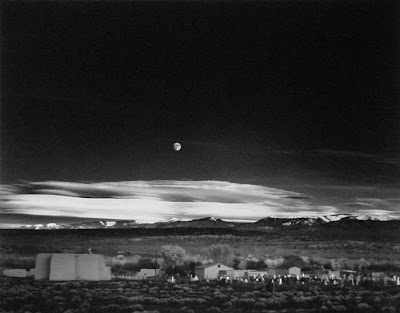Coming to the Corcoran
The Corcoran's fall season will feature two photography exhibitions, Ansel Adams, opening September 15, and Annie Leibovitz: A Photographer's Life, 1990-2005, opening October 13.
Yes, another Annie Leibovitz exhibition at the Corcoran.
When I got the news release, I sent the Corcoran's director, Paul Greenhalgh (who by the way, has been doing a really decent job since taking over the reigns of the Corcoran) a couple of suggestions for future photography shows. One idea "augments" the Ansel Adams exhibition, which will hopefully add a new dimension to yet another Adams photo show.
To start, I will admit that "Moonrise Over Hernandez" is a great photograph and people will oooh and aaah over it, as they have done for the dozens and dozens of previous Adams' exhibitions over the years.
Here's my idea: The Library of Congress has a HUGE collection of Ansel Adams negatives that are the property of the people of the United States.
It is my impression that anyone can (for a nominal fee) get the Library of Congress to print them photos from the Adams' negatives (or any other negative in the public domain I suppose). Already the LofC has even worked out a deal with Zazzle.com to buy a lot of LofC repros/stuff online. In fact, here's an Ansel Adams photo that you can buy from them.
Here's the novel idea: Why not set up an electronic online booth(s) at the Ansel Adams Corcoran exhibition where Corcoran visitors can also preview the hundreds (if not thousands) of other negatives that the LofC owns the copyright to, and provide an easy way for visitors to the Corcoran exhibition to order Adams' photos?
Probably much rarer Adams' photos that seldom see the light of day, much less the moonriselight.
Ahead of time the Corcoran can set up a deal where a percentage of the costs of the Adams' photos would be donated to the Corcoran as a "pass-through-fee."
And then this is a win-win situation for all, as visitors come away with an Adams' photograph, the LofC gets some money out of it, and the Corcoran also gets some additional funds out of it.
The technology is the easy part; getting two separate institutions to cooperate is the hard part.
Nothing heard back from anyone yet.
Tuesday, July 24, 2007
Subscribe to:
Post Comments (Atom)

No comments:
Post a Comment